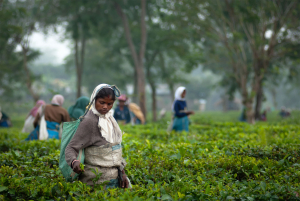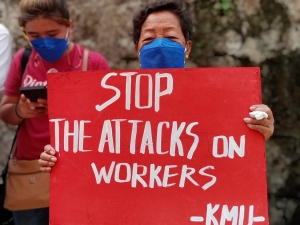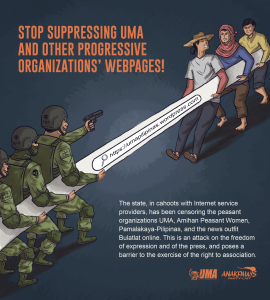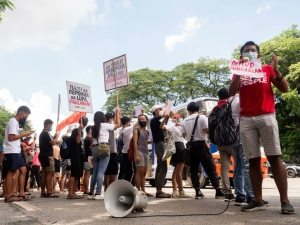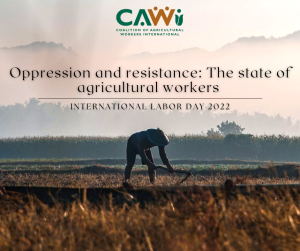As the world marks World Food Day today, we join the Asian Peasant Coalition (APC) in exposing the real situation facing farmers and other small food producers, especially in the poor countries, one that is characterized by worsening hunger and poverty and greater political repression that are figuratively and literally killing rural communities.
Indeed, it is “World Hunger Day” everyday for countless impoverished rural families who struggle daily to survive. Latest data from the Food and Agriculture Organization (FAO) show that 780 million people in developing regions still suffer from chronic hunger and over a billion are extremely poor, living on less than US$1.25 per day. Extreme poverty and food insecurity are most intense in the rural areas, ironically where food production takes place. It is estimated that 75% of the extremely poor in developing countries are in the rural areas. Rural women, who supply 43% of all agricultural labor in low and middle-income countries, are particularly vulnerable as they “face a number of constraints in accessing agricultural inputs, services and markets that make it particularly hard for them to use agricultural production as a pathway out of poverty”. (Source of data here)

Aliansi Gerakan Reforma Agraria (AGRA) together with other people’s organization held protest action against land monopoly in Sumatera, Indonesia last 11 September 2015. (Photo by Ade Ipang)
But as institutions such as the FAO trumpet stopgap measures like social protection, global policy direction dictated by the rich economies and their big corporations points to the same flawed and discredited neoliberal regime that has already massively destroyed agriculture and bankrupted innumerable small farming families worldwide. Bureaucrats, landlords and other members of the local elite who also benefit from these neoliberal reforms loyally implement such policies through national laws and programs.
The recently concluded Trans-Pacific Partnership (TPP) deal, for instance, spells greater trouble for Third World agriculture as the march towards trade and investment liberalization facilitates intensified dislocation and massive land and resource grabbing. With the institutionalization of so-called investor-state dispute settlement (ISDS) mechanism under the TPP, big foreign investors in agriculture are given far-reaching protection while undermining the state’s mandate to regulate investments such as those that lead to land and resource grabbing. Small rural sectors are further disempowered as foreign corporations can directly sue national governments, which are supposed to protect them and uphold their interests through national laws and regulations, in private and unaccountable international arbitration tribunals.
Worse, as rural communities resist land and resource grabbing, assert their human rights and struggle for genuine agrarian reform as the only way out of chronic poverty, they are confronted with intensifying repression. PANAP’s monitoring of human rights violations related to land struggles and conflicts shows that almost six farmers, indigenous people and/or land activists are being killed every month this year. The figures could certainly be much higher as many cases remain unreported. Such repression perpetrated by state forces, paramilitary and private security personnel of corporations and landlords that are in conflict with peasant and indigenous communities is one of the most urgent issues confronting those who defend food sovereignty and the people’s collective rights to land and resources. (See Land and Rights Watch here)
Today, we reiterate our resolve that through collective action, we shall continue to challenge agricultural liberalization, land and resource grabbing, and human rights atrocities against farmers and marginalized rural sectors and their supporters. We shall carry on the struggle to end hunger and poverty, resist political repression and demand justice and accountability, and fight for genuine agrarian reform and food sovereignty. ###
This statement is jointly released by the following organizations:
PAN Asia Pacific (PANAP)
Coalition of Agricultural Workers International (CAWI)
Asian Rural Women’s Coalition (ARWC)
Aliansi Gerakan Reforma Agraria (AGRA) – Indonesia
Sarawak Dayak Iban Association (SADIA) – Malaysia
Kilusang Magbubukid ng Pilipinas (KMP) – Philippines
Pakistan Kissan Mazdoor Tehreek (PKMT) – Pakistan
Roots for Equity – Pakistan
National Fisheries Solidarity Movement (NAFSO) – Sri Lanka
Human Development Organization (HDO) – Sri Lanka
Union of Agricultural Workers (UMA) – Philippines
Farm Worker Association of Florida (FWAF) – USA
General Agricultural Workers Union (GAWU) – Ghana
Coalition of Cambodian Farmer Community (CCFC) – Cambodia
Reference:
Sarojeni V. Rengam, nolandnolife@panap.net


